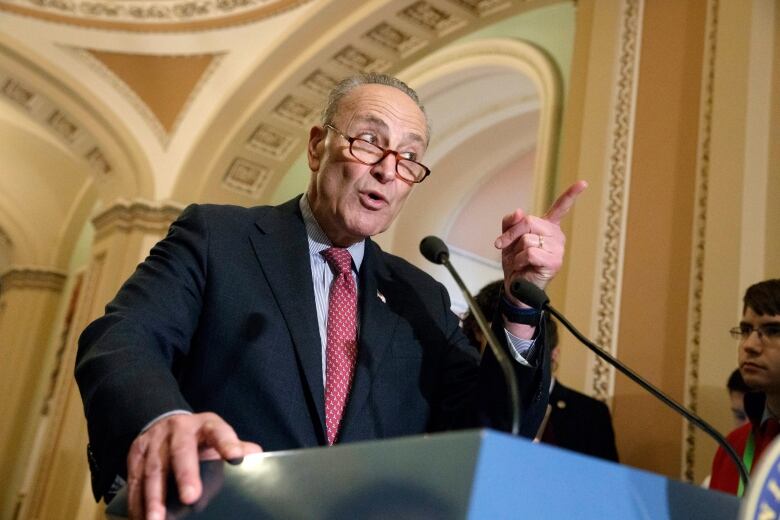Will Trump's Supreme Court pick get the job? What you need to know about the Gorsuch hearing
Neil Gorsuch has had weeks to prepare for the grilling he'll get from senators

After weeks of lobbying, ads, applause and attacks, U.S. President Donald Trump's pick for the Supreme Court is ready for the spotlight in the Senate.
Trump nominated Neil Gorsuch on Jan. 31 to fill the Supreme Court seat left vacant by Justice Antonin Scalia's unexpected death last year.
Since then, Gorsuch's fans and critics have been working hard to make their respective cases and he's been carefully preparing for his big day. Today, he'll have the chance to speak for himself when he's grilled by members of the Senate judiciary committee at his confirmation hearing.
How judges get appointed to the highest legal bench in the country is vastly different in the U.S. than in Canada. Here's a look at how the battle — and it is a battle — over the U.S Supreme Court is unfolding and what's at stake not just for Gorsuch, but for Democrats, Republicans, Trump and the legal landscape south of the border.
How does the confirmation process work?
The Senate judiciary committee holds hearings and then sends its recommendation to the full Senate for debate.

It takes 60 votes, a "supermajority," for that to pass. There are 52 Republican senators so they'd have to convince eight from the other side of the aisle to keep the Gorsuch train rolling. There are 46 Democrats and two independents who tend to vote with them.
When debate ends, there is a final vote and 51 votes are needed to confirm the nominee.
What is the 'nuclear option?'
If Republicans can't get eight votes to end a filibuster they can use what's known as the "nuclear option." That means changing the Senate rules so that only a majority, not a supermajority, is needed to end the filibuster and confirm Gorsuch. They'd rather not go this route. Changing Senate rules is a significant move.
If Democrats don't filibuster, Republicans won't have to decide whether to go nuclear — but Trump urged them to do it if necessary.
Why is this such a battle?
Filling a vacancy is a big deal because the Supreme Court has the power to make major decisions that affect the lives of Americans and the laws by which they must abide.

The battle over this open seat started last March when President Barack Obama nominated Merrick Garland and the Republican majority in the Senate refused to hold a nomination hearing. They argued that because the election was a few months away, the next president should get to choose the nominee. The political calculation paid off when Trump won.
Some liberals are angry and bitter that Garland didn't get his shot, and feel like the seat was stolen from them. They view putting up a fight over Gorsuch as a chance for payback and they're pressuring Democratic senators to resist his nomination. The senators don't want to appear weak so they might make a fuss, but will they go so far as to launch a filibuster? They haven't committed to blocking or supporting Gorsuch.
What's the line of attack from Democrats?

Schumer brought with him several people who say they were hurt by some of Gorsuch's rulings, including truck driver Alphonse Maddin. He took his company to court after he was fired in 2009 for abandoning his trailer in subzero temperatures while waiting for a repair. He won his case but Gorsuch wrote a dissenting opinion and Maddin told reporters it concerns him that he's the Supreme Court nominee.
It's all part of the public relations battle that occurs with Supreme Court nominations in the U.S. Liberal and conservative groups raised millions of dollars to advocate for and against Gorsuch.
How will Republicans defend Gorsuch?
Republicans were happy with Trump's choice, praising Gorsuch as someone with an impressive intellect, solid conservative credentials and great respect for the constitution.
Politico reports that at least 10 Senate staff will operate a "war room" during the hearing and the Republican National Committee will also have one to help pump out instant reactions to what's said at the hearing.
How has Gorsuch prepared for the hearing?
Gorsuch immediately began a charm offensive on Capitol Hill after Trump nominated him. He met privately with 72 senators. The meet-and-greets were a chance to get acquainted but also for Gorsuch to get an idea of what questions he'll be asked at the hearing.

Gorsuch also reviewed past nomination hearings and participated in mock hearings for practise.
If he gets the job, he'd be reaching the pinnacle of his legal career at only 49 years old. It's a lifetime appointment. (Canada's Supreme Court justices must retire at 75.)
What's at stake for Trump?
Trump promised during the campaign that he'd pick someone who is anti-abortion and as conservative as Scalia. Some conservatives, who otherwise weren't fans of Trump, voted for him because of those pledges. Getting Gorsuch on the bench allows Trump to cross another campaign promise off his list.
